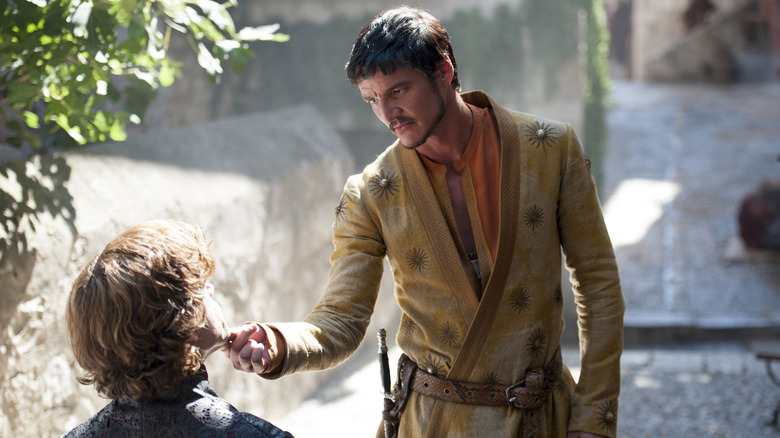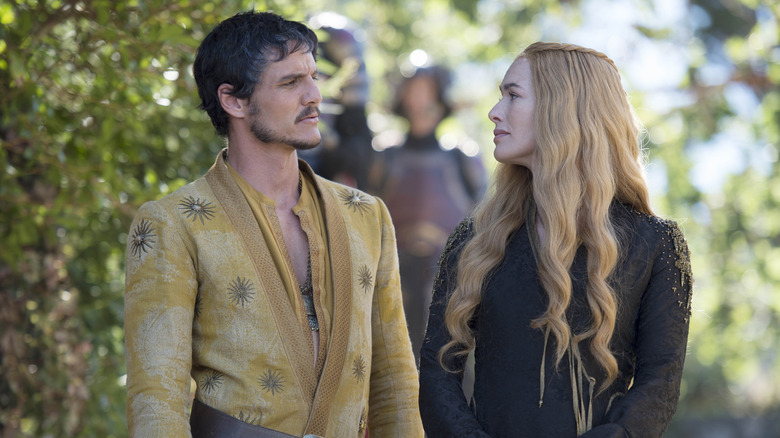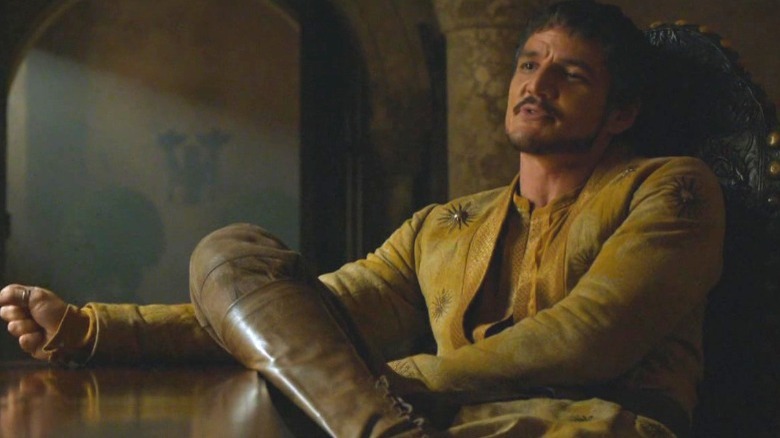Pedro Pascal Didn't Need Any Research To Nail Oberyn's Accent In Game Of Thrones
One of the greatest missteps on the HBO hit series "Game of Thrones" was the show's handling of Dorne, the southernmost kingdom in Westeros. Characters were written out or underwritten, entire storylines disappeared in order to streamline the already sprawling cast, and some of the best bits of George R.R. Martin's "A Song of Ice and Fire" saga were left behind.
Thankfully, one thing the series got right was casting Pedro Pascal as Prince Oberyn Martell, the Red Viper of Dorne. Oberyn's time on the series was far too short, but at least we got to see (and hear) him brought to life by one of the most charismatic actors working today.
In a Reddit "Ask Me Anything" thread, Pascal answered fan questions and explained the accent he used as the Dornish prince. The accent itself isn't specific to any country or region in our world, but sounds sort of like a mix of various Latin American accents to create a uniquely Dornish sound. If Westeros were Europe, Dorne would definitely be a mix of Spain, Italy, and Greece, so the accent makes a lot of sense!
The voice of the Red Viper
Dorne is a beautiful, sun-swept place, with a capital that makes King's Landing look like some backwater village. Sunspear is described as having beautiful water gardens, nearly tropical weather, and being the source of the best wine in the Seven Kingdoms. It's also a pretty progressive place, providing a stark contrast to the rest of Westeros. While Dornish accents are described a bit in the book as well, Pascal hadn't read the books, and his decision to give Oberyn the accent was more instinctual:
"I think that it was just initially an instinct on my part? I could tell even though I hadn't read the books, I was up to date on the show, when I read the audition sights for the character, and I felt like they were ushering in a very new element with Oberyn Martell, and it seemed like it would be interesting if he sounded different than everyone in King's Landing so that there was a very foreign element. He looks different, he dresses different, and I thought it was important that he sound different. He also behaves differently than the rest of the characters, the way he goes up against some of the most dangerous characters with fearlessness is very unique, so I thought it would be very unique to have his sound fall in line, and be sort of unique from others."
Oberyn ended up having a sort of Spanish swagger that's one part Antonio Banderas in "Desperado," and one part Antonio Banderas as Puss in Boots in the "Shrek" franchise. Yet it works perfectly for the character and brings a breath of fresh air to the stuffy politics of season 4.
Justice for Dorne
In the books, Dorne seems to be based on Spain primarily, while the rest of Westeros is loosely the United Kingdom, so it would only make sense for someone from Dorne to have a different accent than the rest of the continent. In Dorne, bastards are treated with the same respect as children born in wedlock, LGBTQ people aren't ostracized, and women have rights. The Dornish are descended from both the original inhabitants of the land and the descendants of the people who came from Essos on Nymeria's 10,000 ships, and they are very different from the rest of their Westerosi cousins. Pascal may not have read the books or done much research for his audition, but he knew exactly what kind of presence he needed to bring to the table for the Red Viper.
Casting for Dorne was fantastic, with Indira Varma as Martell's lover, Ellaria Sand, and the always-incredible Alexander Siddig as Prince Doran Martell, Oberyn's brother and the Lord of Sunspear — so the sped-through Dornish timeline on "Game of Thrones" was a true shame. Hopefully the planned prequel series, "10,000 Ships," will finally give Dorne the due time in the sun it deserves.


